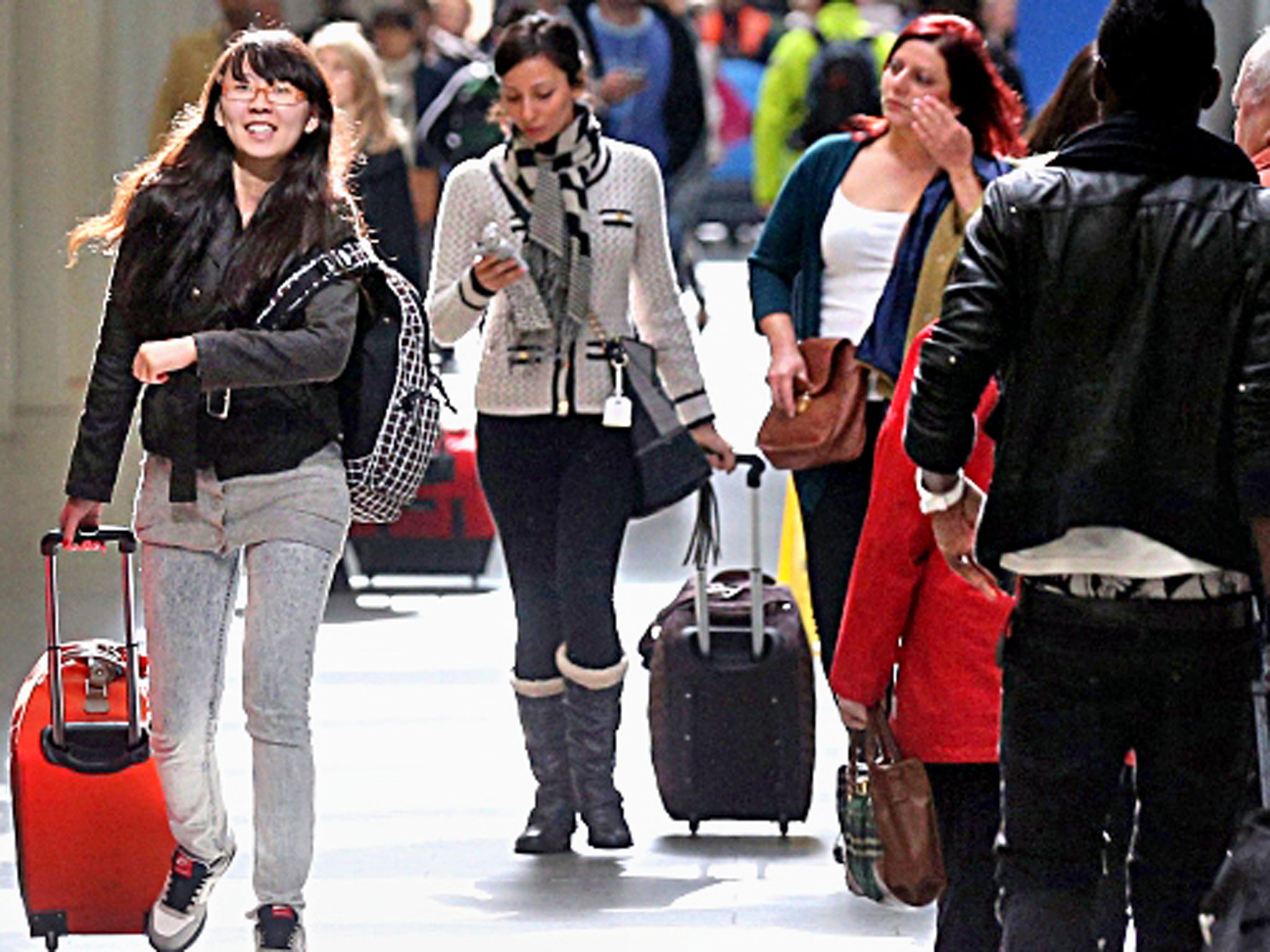Battle of the bulge on before-breakfast Berlin-bound jet
Simon Calder: The man who pays his way

Cabin bags at dawn: not a pretty sight. Just about everyone aboard easyJet's Monday morning flight from Gatwick to Berlin has been up since 4am or earlier, in order to be ready for the 6.50am departure. The vast majority are business travellers, with busy days ahead. So still to be stuck at the gate after seven turns the mood in the Airbus distinctly grumpy. The reason the flight is late? The cabin crew are wrestling.
Not with each other, you understand, but with the excess hand luggage that we passengers have brought aboard. Two positive phenomena have combined on board the plane to produce a negative.
First, budget airlines such as easyJet achieve "load factors" that conventional aviation thinking used to regard as unfeasibly high: through last winter, only 18 seats on the average 156-seat easyJet Airbus flew empty. Better for the planet, better for the airline, better for keeping fares down. Of course, being an average, many flights were even fuller.
Second, easyJet has the most generous cabin‑baggage policy of any European no-frills carrier. You can walk on board with a case whose volume is 63 litres, with no weight limit – you just need the strength to be able to lift it into the overhead lockers.
The trouble is: those overhead lockers are probably already full with other passengers' possessions. Consequently on many flights, such as the before-breakfast Berlin-bound Airbus, bags have to be offloaded and placed in the hold. It adds cost for the airline. And it can be infuriating for the passenger whose bag is selected for expulsion from the cabin. Upon arrival you will have to wait around at the baggage carousel while your fellow passengers speed through the airport; and there is a risk that fragile contents may be damaged by less than tender handling.
The name of the game: more frames
Excess cabin baggage is a problem with many solutions. The most obvious jam-buster is to reduce the maximum size of hand luggage. But this is also the least palatable. Many frequent flyers on easyJet have invested in cases that precisely squeeze into those frames at the departure gate, and are in no mood to part-exchange them for something smaller.
Wizz Air, the leading Eastern European budget airline, has solved the issue by charging passengers extra for carrying bigger bags into the cabin. The carrier reports that passengers seem happy with the new policy. Yet easyJet says it has no plans to introduce a similar fee. Instead, the airline says: all cabin baggage is equal, but this summer, some will be more equal than others.
Starting on 2 July, easyJet abandons its one-size-fits-all policy. Instead, it will adopt a bizarre three-class system. Everyone will still be able to dodge the charge for hold baggage by turning up at the gate with a 63-litre case as heavy as you like. After that, though, the new policy gets disagreeably complicated for most travellers.
The people for whom nothing changes are "premium" passengers – those travelling on so-called flexi-fares, people who have paid for seats up front or with extra legroom, and anyone with an easyJet Plus card. They are invited to use Speedy Boarding "to board first in order to secure space in the overhead lockers".
The rest of us will be faced with a choice: either bring a significantly smaller bag (40 litres, one-third less than the current limit) or stick to the bigger bag and take the risk that "on some busy flights your bag may have to go into the hold" – just as you do at the moment.
At the gate, passengers will get their luggage checked against two sets of dimensions. You will be "framed", twice.
Stand by for a new dimension of doubt
The airline will have reached its complicated conclusion after plenty of discussion. It keeps the same basic policy in place, which is good. And easyJet is betting that a reasonable minority of passengers can be persuaded to downsize. If the airline turns out to be right, then the battle of the Berlin bulge will be over.
It looks to me, though, that the move adds yet more complication and will create a whole new dimension of disputes beyond the usual "Well, it fitted into the frame on the way out here, so I don't see how it doesn't now" line of argument. In future, you could witness rows that begin "How dare you offload my bag? It's smaller than his."
As an indication of the confusion that is likely to spread among passengers in the run-up to its implementation, easyJet warns in big letters: "Please note that the new cabin bag guarantee only applies after the 2 July 2013. If you bring the 50 x 40 x 20cm bag before that date, we cannot guarantee that it will travel with you."
Surely it would be a lot less disruptive to impose a weight restriction, as every other budget airline does. Make 10kg the limit, and I would probably turn up with a smaller bag next time. While I would be faintly miffed, it would be a lot less annoying than seeing my precious possessions consigned to the hold – or calculating the collective loss of time due to those early-morning wrestling bouts at South Terminal.
Join our commenting forum
Join thought-provoking conversations, follow other Independent readers and see their replies
Comments
Bookmark popover
Removed from bookmarks